Categories
- Antiques & Collectibles 13
- Architecture 36
- Art 48
- Bibles 22
- Biography & Autobiography 813
- Body, Mind & Spirit 142
- Business & Economics 28
- Children's Books 16
- Children's Fiction 13
- Computers 4
- Cooking 94
- Crafts & Hobbies 4
- Drama 346
- Education 46
- Family & Relationships 57
- Fiction 11829
- Games 19
- Gardening 17
- Health & Fitness 34
- History 1377
- House & Home 1
- Humor 147
- Juvenile Fiction 1873
- Juvenile Nonfiction 202
- Language Arts & Disciplines 88
- Law 16
- Literary Collections 686
- Literary Criticism 179
- Mathematics 13
- Medical 41
- Music 40
- Nature 179
- Non-Classifiable 1768
- Performing Arts 7
- Periodicals 1453
- Philosophy 64
- Photography 2
- Poetry 896
- Political Science 203
- Psychology 42
- Reference 154
- Religion 513
- Science 126
- Self-Help 84
- Social Science 81
- Sports & Recreation 34
- Study Aids 3
- Technology & Engineering 59
- Transportation 23
- Travel 463
- True Crime 29
Las Casas 'The Apostle of the Indies'
by: Alice J. Knight
Categories:
Description:
Excerpt
CHAPTER I
BARTOLOMÉ THE YOUTH
Whenever we hear of a famous man,—whether he be artist, author, statesman, soldier, scientist, great traveler, or missionary,—we like to know what sort of a boy he was. We are curious about his home, his school, his parents, his friends, and all the various influences that helped to make him the man he was. Such knowledge gives us a better understanding of his after life, and a fuller sympathy with his aims and achievements.
Although I have headed this chapter "Bartolomé the Youth," we know comparatively little of Las Casas until he was about twenty-eight years old. In later life we find him impetuous, loving, tireless in energy, with a fiery temper that blazed out in quick wrath against all injustice and cruelty toward the weak and helpless, possessing a brilliant mind and great talents, never giving up striving against the wrong, and never knowing when he was beaten. These qualities he must have possessed in some measure as a boy, but, unfortunately, no historian has opened up for us those early pages.
Bartolomé was born in the city of Seville, Spain, in the year 1474. We are not told the day of the month. Of his mother we know nothing, but his father was Pedro de Casaus. He was of French descent, but the family had lived in Spain for over two hundred years, and because of valuable aid given to one of the Spanish kings in the wars against the Moors, they had been ennobled, and after a time the name lost its French spelling and took the Spanish form, Las Casas.
Bartolomé certainly lived in very interesting times. When he was between eighteen and nineteen years of age Columbus came to Seville on his return from his first voyage, which resulted in the discovery of the West India Islands. He brought with him many strange and wonderful things,—birds of brilliant color, such as had never been seen before, gold and pearls, and, most wonderful of all, six Indians. We can imagine the crowds of people who must have followed that little procession as it passed through the streets of the city, pushing and crowding one another to get a sight of the great Admiral and the men who had sailed with him over unknown waters, and especially of the painted red men, who were, I am sure, quite as curious on their part, and probably badly frightened besides.
It is difficult for us to understand now how much courage it took in those times to put to sea in frail little caravels, which were all the adventurer had, and go sailing over the waste of waters, not knowing what was ahead of him, or if he would ever find land on the other side. The rude maps of that day still showed a great Sea of Darkness. Dragons and all sorts of frightful sea-monsters were pictured in the unexplored parts of the ocean, and the popular idea was that if the daring mariner should sail too far over the slope of the round globe, he might be drawn by force of gravitation into a fiery gulf and never come back to his friends again. So the men that thus ventured were heroes in the eyes of the people. Never had such a voyage been heard of as the great Admiral had made, and all, from the King and Queen to the little street boys, were eager to hear about it.
Although he does not mention it, it is probable that Las Casas often saw Columbus in his father's house. Pedro de Casas, Bartolomé's father, and his uncle, Francisco de Penalosa, both went out with the Admiral on his second voyage. Columbus had then been made Viceroy of the Indies, and Bartolomé's father was on his staff, while his uncle commanded the soldiers. One of the Indians that Columbus brought home from the first expedition he gave to Pedro de Casas, but the good Queen would not allow these Indians to be kept as slaves, and insisted that they should be sent back at once. All six had been baptized at Barcelona, with the King and Queen,—Ferdinand and Isabella,—as godfather and godmother; and when, soon after this, one of them died, people said he was the first Indian to go to Heaven....


